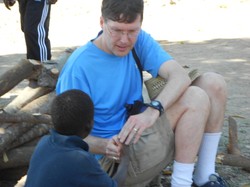“I want to be a witness to what the Haitian people are already doing through God’s spirit,” pastor Tom Rice said while sitting on a porch in the rural area of Hinche, Haiti. “I’ve seen God at work here, and it’s inspiring. I want to witness to other churches when I return and celebrate and support Haitians.”
Rice was part of a small mission group of four people from Royal Oak (Mich.) Presbyterian Church that traveled to Haiti in February 2012. They decided to make the trip following a visit to their church from mission co-worker Mark Hare.
Hare shared the impact of his work with the farmers’ movement of Papaye, known as MPP or more formally as Mouvman Peyizan Papay (see box). MPP is a longtime partner of World Mission. Through MPP’s programs, Hare has been helping Haitian farmers since 2004, sharing as well as learning new practices to grow more food on small tracts of land. The work of MPP helps more Haitians become self-reliant. Through small-scale farming they’re able to feed their own families and provide a livelihood for themselves by selling what’s left.
Royal Oak members learned about Hare’s work through World Mission. The congregation supported him through donations to World Mission for many years. In 2011, Royal Oak asked Hare to come speak to them. After hearing Hare’s story of how working alongside Haitians was a spiritually nurturing experience, several church members wanted to help.
“The [World] Mission Network is so important because it provides a connection and way for us to help,” Rice said. “It matters because this is a way for us to be deliberate in our mission and what we’re called to do through Christ’s love.”
“We did mission work on the Gulf Coast, but when Mark came and spoke I knew I wanted to do a mission group outside the U.S.,” noted Trish Sheen, a Royal Oak member who also traveled to Haiti. “When you’re on a mission trip, you’re actually living out what Christ teaches us.”
Mariana Haughey, also a member of Royal Oak, and her friend Leila Sears, two young adults, made up the rest of the small mission group. Hare took time to acclimate the four to their surroundings, introducing the missionaries to farmers in Hinche who were eager to share how well their crops were doing and discuss ways to improve their yield.
The group helped with some agriculture projects, visited a new eco-village (four additional villages are being funded by the Presbyterian Haiti Response Team), and were shown how the farmers are using tires as containers for growing more food, a project Hare spearheaded in Hinche. But the group had another focus: dental care.
During Hare’s presentation to the congregation he asked members to think about what skills they might have that could help the people of Haiti. Haughey said she knew immediately what she could do.
Haughey is a dentist and knew she could use her skills to help children and parents. Sears is training to be a dentist and offered to assist her friend. They brought suitcases filled with toothbrushes, toothpaste, and other supplies, including several puppets.
“So, let me see. I brush from top to bottom, back and forth, and I brush my tongue, and I brush the inside of my teeth. Is that right?” Rice asked a packed room while kneeling behind a table and holding a puppet.
With the help of translator Jessie James, the four missionaries put on a puppet show for parents, teachers, and children to explain the basics of dental care and why it’s important in disease prevention as well as keeping your teeth healthy. They even came up with a song that was translated into French Creole, the native language of Haitians (see the video).
For members of the mission group, the trip was not just about helping others but about living out their faith and getting to know Haitians.
“It’s important to take five minutes and think of someone else,” Haughey said. “Think how it would be for you if it were you. We all need help sometimes. Christ wants us to help each other.”
“They are opening their hearts to us as much as we are to them,” Sheen added. “Every time we give, whether through donations or by volunteering, we are enabling all of God’s people to help themselves.”
“Unfortunately, we in the United States know very little about who Haitians are and how beautiful their culture is and how faithful they are,” Rice said. “We are called to be witnesses and take part in what God is doing with and through the people of Haiti.”
What skills do you possess that might help others in Haiti and elsewhere? Connect with our Mission Network and share how you can help spread God’s love through service.
Our Partner in Mission
Mouvman Peyizan Papay (MPP) is a grassroots movement whose goal is to help small farmers improve their living conditions. It began in 1973 in the small community of Papaye and now has members throughout Haiti.

